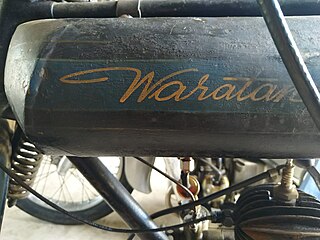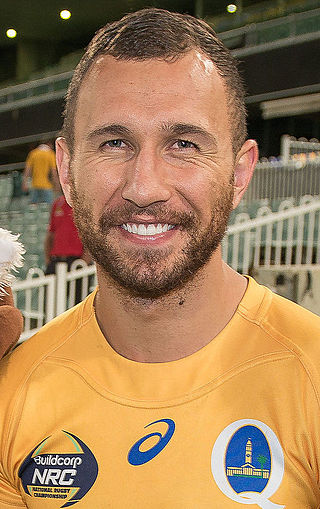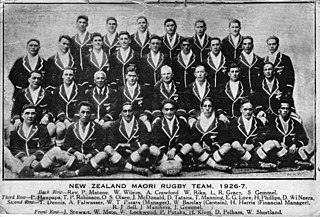
Wayne James Bennett AM, also known by the nickname "Benny", is an Australian professional rugby league coach who was signed in late 2021 for three years by the Dolphins in readiness and preparation for their inaugural 2023 season in the National Rugby League competition. He was previously the head coach of the South Sydney Rabbitohs among other clubs, and a former rugby league footballer.

The Australia national rugby union team, nicknamed the Wallabies, is the representative national team in the sport of rugby union for the nation of Australia. The team first played at Sydney in 1899, winning their first test match against the touring British Isles team.

Waratah motorcycles were manufactured in Sydney, Australia, from before 1911 to around 1948, although Waratah badged motorcycles were sold into the 1950s.
The New South Wales Rugby League premiership was the first rugby league football club competition established in Australia and contributor to today's National Rugby League. Run by the New South Wales Rugby League from 1908 until 1994, the premiership was the state's elite rugby league competition, parallel to Queensland's first-class league, the Brisbane Rugby League.

Quade Santini Cooper is a professional rugby union player and occasional boxer. Although born in New Zealand, he has represented Australia in rugby at international level. He currently plays for Hanazono Liners in Japan, and is a former player for the Queensland Reds and the Melbourne Rebels in the Super Rugby competition in Australia. His preferred position is fly-half.

The 1899 British Isles tour to Australia was the fourth rugby union tour by a British Isles team and the second to Australia; though the first tour in 1888 was a private venture, making the 1899 tour the first official undertaking of Australia. It is retrospectively classed as one of the British Lions tours, as the Lions naming convention was not adopted until 1950.

Arthur "Jack" Verge was a rugby union player who represented Australia, New South Wales and Sydney University. Playing as a fullback, Verge won both his caps for Australia in 1904 against a touring team from the British Isles. Although he was relatively light for his position, he was repeatedly praised for his tackling and all-round defensive work, and in attack, he was a fast and deceptive runner. His kicking, on the other hand, was inconsistent.
The 1923 Waratahs tour of New Zealand was a series of rugby union games undertaken by the New South Wales Teams against invitational and national teams of New Zealand.
The Queensland Rugby Union had collapsed in 1919 and would not be reborn until 1929 leaving the New South Wales Rugby Union to administer the game in Australia at the national representative level. In 1923 the New South Wales side toured New Zealand In 1986 the Australian Rugby Union decreed the five full-internationals played on the tour as official Test matches.
The 1925 New Zealand tour rugby to New South Wales was the 12th tour by the New Zealand national team to Australia.
The 1925 Waratahs tour of New Zealand was a series of rugby union games undertaken by the New South Wales Teams against invitational and national teams of New Zealand.
The 1926 New Zealand tour rugby to New South Wales was the 13th tour by the New Zealand national rugby union team to Australia.

The 1926–27 New Zealand Māori rugby union tour was a collection of rugby union games undertaken by the New Zealand Māori team against invitational and national teams of New Zealand, Australia, France, Great Britain and Canada.
The 1931 Australia rugby union tour of New Zealand was a series of rugby union games undertaken by the Australia team in New Zealand against invitational and national teams of New Zealand.
The 1920 Great Britain Lions tour was the third British national rugby league team or 'Lions' tour of Australasia, where it was winter and matches were played against the Australian and New Zealand national sides, as well as several local teams. In Australia, the three-Test match series was won by the hosts. In New Zealand another three-Test series was played and won by the visitors. The tour was a success and brought in a handsome profit.
The first season of Rugby League in Queensland saw the formation of an association in March 1908, footballers begin training in the new code by early May, and the first in a series of representative matches played on 16 May. Club football began after teams representing Queensland had played, and then only as junior matches.
The 1932 Great Britain Lions tour was a tour by the Great Britain national rugby league team) of Australia and New Zealand which took place between May and August 1932. The tour involved a schedule of 26 games, 18 in Australia including a three-test series against Australia for the Ashes and a further eight in New Zealand including a three-test series against New Zealand.
The 1950 Great Britain Lions tour was a tour by the Great Britain national rugby league team of Australia and New Zealand which took place between May and August 1950. The tour involved a schedule of 25 games: 19 in Australia including a three-test series against Australia for the Ashes, and a further 6 in New Zealand including two test matches against New Zealand. A scheduled fixture in Forbes, New South Wales, against a Western Districts team, was abandoned when the chartered plane could not land due to bad weather. Captained by Ernest Ward, the Lions returned home having won 19 and lost 6 of their games. The team won the first test match of the tour but lost the second and third to lose the Ashes Test series to Australia. The team also lost both Test Matches in and against New Zealand. Despite being a British team – five of the squad were Welsh – the team played, and were often referred to by both the press at home and away, as England.
The 1954 Great Britain Lions tour was a tour by the Great Britain national rugby league team of Australia and New Zealand which took place between May and August 1954. Captained by Dickie Williams, the tour involved a schedule of 32 games: 22 in Australia and 10 in New Zealand, with two three-match Test Series against both nations.
The tour began inauspiciously, with Great Britain losing four of their first seven matches, including the First Test against Australia in Sydney. Moving into the Queensland leg, the Lions' results improved, and they won all nine of their matches in the state. This included victory in the Second Test in Brisbane.
A common feature of many of the tour matches was rough play, punches being throw in and out of tackles. The July 10 match against New South Wales was abandoned by the referee seventeen minutes into the second half due to persistent brawling by the players.
One week after the abandoned game, Australia won the Third Test to claim the Ashes by a 2-1 margin.
Moving to New Zealand, Great Britain lost the Second Test, but recovered to win the Third Test and the series, by a 2-1 margin.
The tour concluded with three matches in five days back in Australia at Sydney, Canberra and Maitland.
Despite being a British team – five of the squad were Welsh, two from Scotland and hooker Tom McKinney from Northern Ireland – the team played, and were often referred to by both the press at home and away, as England.
The 1937–38 Kangaroo tour was the sixth Kangaroo tour, in which the Australian national rugby league team travelled to New Zealand, Great Britain and France and played thirty-eight matches, including the Ashes series of three Test matches against Great Britain, and two Test matches each against the Kiwis and French. It followed the tour of 1933-34. Following a cessation of overseas international tours due to World War II, the next tour was staged in 1948-49.






